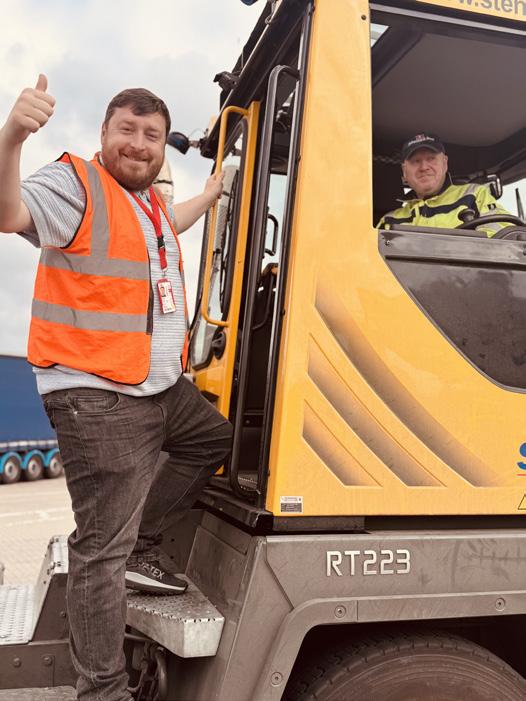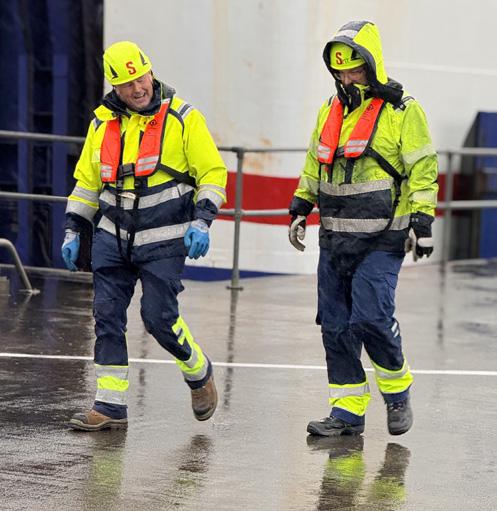





Since the last publication I have visited several workplaces covered by the Docks, Ports and Waterways sector of the union, working with reps, improving engagement and also recognising areas that require more effort and attention to make us stronger and equipped to improve workplace terms and conditions, tackle any workplace injustice, have an understanding of what your workplace priorities are and ensure that we are ballot ready within the workplace.
Within this sector of the union, we have had several new reps elected recently and we will be encouraging those reps that are newly elected to attend RMT
training courses and develop representative networks across the sector and beyond that ensures that our reps can call upon RMT activists around the UK to compare terms, strategies and priorities outside of your own workplace.
I would also like to emphasise that every member can become active within the union by ensuring that all industrial and health and safety positions are filled, but also by using your knowledge and expertise in the workplace to create improvements to equality issues, pensions and retirement, organising young members or improving awareness of mental health within your workplace.
As a union I want members to work with branch officials and lead officers to create a workplace that is well organised, where members fully understand your terms and conditions of employment and you are setting the agenda of what you want to see us prioritising within the workplace, or beyond. Sitting in silence or complaining in the messroom or on social media won’t to improve anything, and improvements can be achieved in every workplace in which we organise but only through a co-ordinated, strategic approach.
The biggest barrier to a better organised, stronger workplace in your sector is attitude. We must recognise that in some areas we have been guilty of normalising bad practice, acceptance of poor pay, changes to policies and procedures without consultation, and allowing management to go unchallenged on matters of importance to you. To fight back against this, we must be better organised, more effective at communicating and seeking more activists in every workplace. Become active today by getting in contact with myself or your lead officer.
Your union has recently introduced sectoral maritime organising meetings that allow us to break down the sectors in which we organise to compare pay and terms and conditions of employment and working practices.
This helps us make progress and implement union policy for your sector we need to think about what we should be striving for as minimum standards that we expect specifically within this sector. Whilst your sector is broad in terms of the grades included within, we must look to develop improvements, this may be in sickness cover, death in service / life assurance, pension contributions apprentices or health and safety standards.
As a union we must ensure that we are discussing the impact of new technology within the sector, what does this entail and what impact direct and indirectly does this have on our current roles and future projections for jobs roles and job security. Whether this is about electric engine plug-ins within ports, carriage of electric vehicles, port infrastructure, the use of AI in clerical roles and beyond or vessel energy source we must be engaged and asking questions in meetings with employers and seeking an overview of employer programmes.
Please see pictures from workplace visits across the various employers in your sector since the last publication, raising the visibility and accessibility of RMT for the membership. We worked to provide updates, answer questions and assist with the recruitment of your colleagues who are not yet a member of the RMT. As your national secretary, I know how important it is for your union to be in the workplace, and we know that our members appreciate and benefit from this openness and accessibility.










I would like to congratulate Daren Ireland who was previously the lead officer for several Docks, Ports and Waterways’ employers in his previous capacity as regional organiser in the Northwest, based in the union’s Liverpool office. Whilst Daren has a railway background, his meticulous attention to detail and ability to negotiate have secured the respect of members at the companies he covered.
Daren stood in the recent election for RMT assistant general secretary (AGS) and was successful. He no longer has responsibility as a lead officer within maritime and now works out of Unity House with the general secretary, Eddie Dempsey, senior assistant general secretary, John Leach and me.
Daren will be an asset to the national leadership, utilising his clear attributes, including his understanding of the complexities we face within the maritime sector to make us stronger as a trade union.

Most members will know that conducting industrial action ballots is a very important part of the union’s strategy in defending members’ terms and conditions and is fraught with legal difficulties. Here, we can expand on this and provide further information on the balloting process to assist in members’ understanding of the complexities.
First of all, when a report is received from your regional organiser or a resolution from your RMT Branch, this will be placed before the national executive committee for consideration and if it decides to declare a dispute with the company, we write to the company listing the issues in dispute. This forms the first part of the legal notices. Then the NEC may take a decision to conduct a ballot for industrial action, which can consist of strike action and/or industrial action short of a strike. It is usually beneficial to ballot members for both forms of action to give more options later on but this does not mean that any action will necessarily be called.
A legal notice of ballot, ballot paper and ballot info sheet are then drafted. This starts with an exercise to make sure all members details are correct including their workplace, job title and contact details. This is especially important as the company is notified of the number of members at each workplace, the number of members in each job category and the total number of members concerned – if this information is not correct it can lead to the company challenging the ballot and in some cases, means we have to call off the ballot and start again. We also need all members’ current addresses as ballots are legally obliged to only take place by post. Plans are in place to allow online voting but that is not part of the current legislation.
Each member included in the ballot will then be sent a ballot paper and ballot info sheet by post from Civica Election Services with a freepost return envelope. These will give the member the opportunity to vote for industrial action and the ballot info sheet provides further information on the dispute. We can send out replacement papers to any member who hasn’t received them during this period, either through them being lost in the post or they have changed address.
On the ballot closing date, Civica Election Services will send a report of voting to head office giving the result. Under the current legislation, 50% of the total number of members who were balloted must have returned their ballot and 40% of the total number of members who were balloted must vote ‘yes’ for action to be able to take place. You will receive reminders from us during the voting period as if we don’t meet these thresholds then the ballot will fail.
Once a successful ballot mandate has been achieved, which meets the above criteria, the NEC can then take a decision to call industrial action, and we then send the legal notice of action to the company and inform members of the details of the action.
The whole process, from sending the notice of ballot, to the first possible date for industrial action, takes at least 6 weeks. A week between the notice of ballot and ballot papers posted to members, 3 weeks balloting period, then two weeks’ notice of action before the action starts. After 6 months from the ballot closing
date, the ballot mandate expires, and we have to re-ballot members again from scratch if we want to continue taking industrial action.
Referendums have no legal standing. They are carried out according to the rules of the union and through decisions taken by the NEC and government legislation has no bearing on the process. They can vary in length, depending on how quick union negotiators or NEC want them to be and can also vary depending on the constituency taking part. They are carried out online and all members are sent an email with a voting link, which contains a passcode allowing them to take part. Members must have an email account to take part, and they are sent all the relevant information relating to the vote, including full details of the proposals subject to that vote, by email.
The results of the referendums are then placed back in front of the NEC, which notes the outcome and instructs the general secretary to advise members of the result. Head Office staff strive to act on results of referendums as quickly as possible after the NEC has considered them.
Within your sector we organise a lot of different grades, but we would like to point out the importance of ensuring that we seek to engage with grades that are not included within your bargaining unit to ensure that they have a voice and recognition and that we make your port or quay as strong and as unionised as possible.
There are many exploitative employers who prefer to have unorganised workers on zero hour contracts, on split shifts on NMW, we must seek to tackle this where we can and would in the first instance ask that members engage in conversations with colleagues who you may see on a regular basis about working conditions and getting organised so that they have a voice within the workplace. We have seen our recognition agreements and influence grow within the docks, ports and waterways sector thanks to members engaging positively, but in any port, there are still unorganised workers, they may be cleaners, clerical staff, security or work in retail outlets. In some cases, they may be members of your family, friends and will most definitely be a part of your local community. Only by standing together, irrespective of grade or employer will it make us stronger to deliver in your locality.
As a union we are unique in that we elect all our representatives from local workplace level to national positions. Most other unions appoint officials except for the general secretary, which must be an elected position. This is your opportunity as an individual to influence the outcome of an election. If you receive vote, then the position that you are being asked to vote on will have a direct influence in your area/region or grade. Members should be proud of our democratic structures and make every effort to use your vote in internal postal elections. t will take no more than 5 minutes to read, vote and place your vote in the post. For clarity the positions that members of the Docks, Ports and Waterways members will be asked to vote on are:
• General Secretary (5-year term)
• National Secretary (5-year term)
• Assistant General secretary x2 (5-year term)
• President (3-year term)
• Assistant National Secretary (5-year term)
• Regional organiser (5-year term)
• Relief Regional Organiser (5-year term)
• National executive committee member (3-year term)
So, the next time a ballot paper lands on your doorstep, take the time to vote and discuss this within your workplace.
To ensure that rank and file members of the union understand how we as a union function, what sets us apart from other trade unions as the most democratic trade in the UK it is important you know who does what within the RMT union. In this edition we will concentrate on the role of the NEC.
The union is run by the national executive committee (or ‘the executive’), which consists of the president, the general secretary, two assistant general secretaries, the national secretary and sixteen representatives: twelve from the general grades, four from the maritime grades.
A detailed list of the powers and responsibilities of the national executive committee can be found in Rule 4 of the union’s rule book: broadly speaking, it is responsible for the general administration of the union.
The general and maritime grades representatives stand for election in a geographical area and get elected for a three-year term of office. During this time, the NEC members are released from work and paid a salary by the union.
A record of the decisions made in NEC meetings is sent to branches every month. They are also posted in the members area of this website. Branches can appeal to the annual general meeting against decisions made by the National Executive Committee.
NEC meetings are the way in which the business of the union is dealt with, whether it be discussing the progress of a particular set of pay negotiations; formulating recruitment strategy; deciding what motions to put on the agenda of the TUC congress; or setting the membership subscription rates.
Members of the National Executive Committee are elected by all the members in the geographical area they represent and, as such, they are accountable to that membership. They attend and make regular reports to their regional councils, as well as being involved in their region’s recruitment activities. It is at these meetings that they can be asked for further details about issues that have been dealt with and, if necessary, called to account for their decisions.
At present we have a vacancy within Maritime and the remaining 3 seats are filled by:



Gareth is currently employed by RFA and been at sea for 27 years, working in the deck dept and is a member of Southampton Shipping and has been elected until December 31st 2027.
Dave is currently employed by Stena Line and has worked at sea for 30 years, working for both Stena line and RFA as a steward, most recently onboard the Stea Adventurer out of the port of Holyhead. Dave is a member of Holyhead shipping and has been elected to the NEC until 31st December 2026.
Davey has been at sea for 35 years working for several employers during that period as a cook. He is currently employed as a head chef for NorthLink Ferries operating on the Aberdeen – Orkney/Shetland route and he is also the current branch secretary of Aberdeen shipping branch. Davey is elected until 31st December 2025 and an election his successor will commence shortly.
Your RMT membership entitles you to £5,000 of free cover which pays out if you should die because of an accident:
• Cover lasts for 12 months – annually renewable and always free
• Guaranteed acceptance for UK residents aged 18-69
• This policy is underwritten by Stonebridge International Insurance Ltd
Members can visit the RMT website for more information or contact the company directly by calling 0800 033 4184 for further information. Terms and conditions apply.
If members are not receiving correspondence from the union via text and email it is because we do not have your correct details. Quite often members will change jobs, change employers, change mobile number or email address and do not inform the union of these changes. In order to effectively communicate with our members, we need to ensure that the details we hold on file for you are up to date and correct. Members can easily update details by:
• Log on to our website: www.rmt.org.uk/about/update-your-details/
• Email membership@rmt.org.uk and include your name, membership number (or national insurance number), along with your current address information.
• Call 0800 376 3706. Remember to have your membership number or National Insurance number available when you call.
The following are benefits that are available to RMT members:
• Individual and collective representation within the workplace supported by local, regional, and national representatives.
• Full representation at disciplinaries, grievances, flexible working request meetings, welfare meetings, and attendance management hearings.
• Better pay
• Improved conditions
• Health and safety protection
• Legal cover – workplace and criminal for members and their families.
• A credit union
• Accident benefit
• Orphan benefit
• Retirement benefit
• Free will service
• Death grant
All member benefits can be found on the website at www.rmt.org.uk
It is important to remind those not in the union of the benefits of being in the union and also raise awareness amongst our current membership of the benefits that RMT as a trade union offers.
I hope this update has been helpful and gives an insight into the work of your union across the sector and I would encourage every member to consider becoming more actively in the union to build stronger, more effective union within your workplace.
The more activists we can develop to assist in creating a better organised workforce the more beneficial it will be for you and your colleagues, because the one thing every boss fear’s is a well organised union and as our previous General secretary, Bob Crow once said “It all comes down to one thing – who’s better organised: us, or them?”
There is nothing to stop any individual becoming involved in the union, becoming a rep where we don’t currently have a industrial or health and safety representatives, and if we currently have reps in place you can support them by and concentrating on specific areas that you feel need developing such as women’s issues, young members issues, pensions and retirement planning, mental health or equality within the workplace. I would ask that you consider becoming involved and you can become more actively involved today by recruiting a colleague who is not currently a member of the RMT to join the union today.
